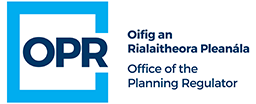The Office of the Planning Regulator (OPR) has today, 30 December, published its Annual Overview of the Planning System 2021. The report reviews key trends and outputs over the year in the wider planning system in Ireland. It includes a comparison with patterns in previous years and is the only analysis of its kind of the Irish planning system.
The report also identifies and makes observations on some of the key trends which reflect Ireland’s planning performance in 2021.
Some of the key findings in the report are:
- There was a 29% increase in planning applications made in 2021 compared to 2020. The total figure of applications (39,934), is the highest figure since 2008;
- However, the declining approval rates for planning permissions continued in 2021. In total, approval rates have declined by 2.5% since 2016. However, last year, 88.5% of planning applications were granted permission which represents a positive outcome;
- There is a large disparity between the local authority with the lowest grant rate for permissions (Louth County Council, 77%) and the highest (Tipperary County Council, 97%);
- In 2021, 42,991 residential units were granted planning permission, a marginal decrease (3.5%) on 2020, and the first annual decline since the recession. Nevertheless, the number of residential units securing planning permission remains at a high level;
- At the same time as this small decrease in residential units granted planning permission, the overall number of applications granted permission for residential development increased by approximately 37%. This indicates that a greater number of permissions were granted for smaller housing developments;
- In 2021, the trend evident in 2019 and 2020 of increasing rates of apartments permitted and decreasing rates of house units permitted, continued – 26,272 apartment units and 16,719 house units. This compares with 26,224 apartments and 18,314 house units in 2020;
- In 2021, one-off houses accounted for 45% of all houses permitted in the State at 7,499 units. This compares to 27%, 29% and 30% in 2018, 2019 and 2020, respectively, and represents an increase of 42% over the 5,292 one-off houses permitted in 2020;
- An Bord Pleanála received its highest number of planning appeals (2,321) since 2012;
- The extent of sites designated by local authorities as either vacant and/or derelict is very low in comparison to the number of vacant dwellings recorded by the CSO.
Commenting on these findings, Planning Regulator, Niall Cussen said:
“2021 was a year in which local authorities and An Bord Pleanála continued to deliver key statutory planning functions within strict timelines and in an operational environment that was challenging due to public health restrictions imposed as a result of the Covid pandemic
It is a great credit to the planning process in general that high levels of throughput in handling planning applications and appeals continued despite the pressures.
In relation to patterns of planning, close monitoring will be required to see whether data signalling a shift towards a greater number of planning applications for smaller housing development proposals, and one-off housing, as opposed to larger scheme type housing in cities and towns, becomes a trend in 2022 and beyond.
This is because if such trends were to continue or escalate, they would potentially be in conflict with the objectives of Government policy in terms of securing a more compact and sustainable pattern of overall development.
2021 was also a year of very significant activity by local authorities in starting to implement funding streams aimed at securing urban and rural regeneration. However, a critical function to such investment will require concerted action on vacant and derelict buildings.
While core planning functions continue to experience high volumes of activity, more is also being asked of local authorities.
There is an increasing demand on our planning system. However, there is a largely static resource base, limited learning and development and planning fees represent only a small fraction of the cost of delivering planning functions.
Therefore, funding and resourcing the planning service in Ireland will likely determine whether or not it can deliver on its increasingly recognised and crucial function in enabling the proper planning and sustainable development of our country.”
The OPR was established in April 2019 on foot of recommendations made by the Tribunal of Inquiry into Certain Planning Matters and Payments (the Mahon Tribunal).
Its purpose is to oversee the continuous enhancement of Ireland’s planning process and its outcomes by driving the co-ordination of planning policy implementation across national, regional and local levels, building a stronger knowledge base and ensuring regular reviews of the performance of planning authorities and An Bord Pleanála.
